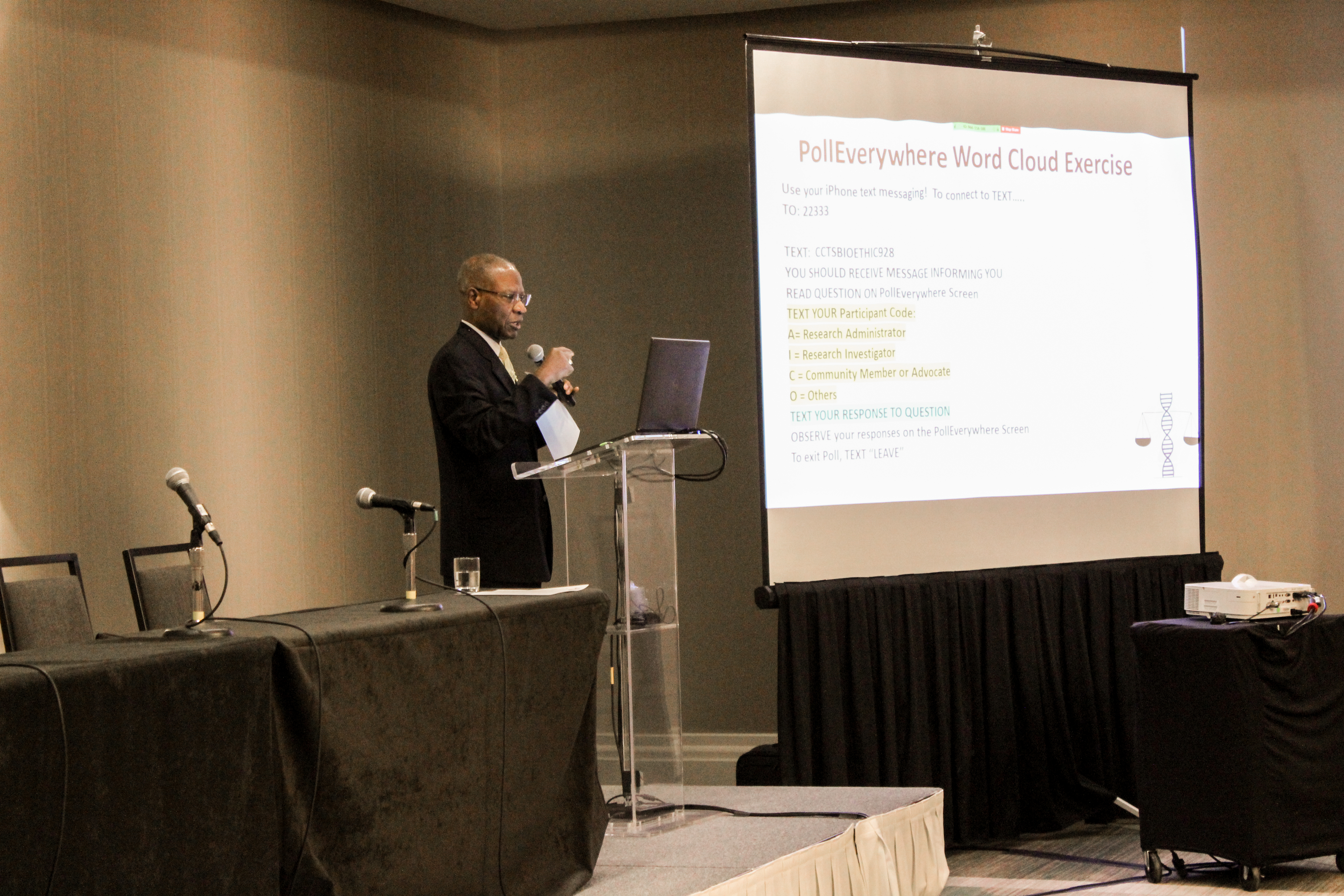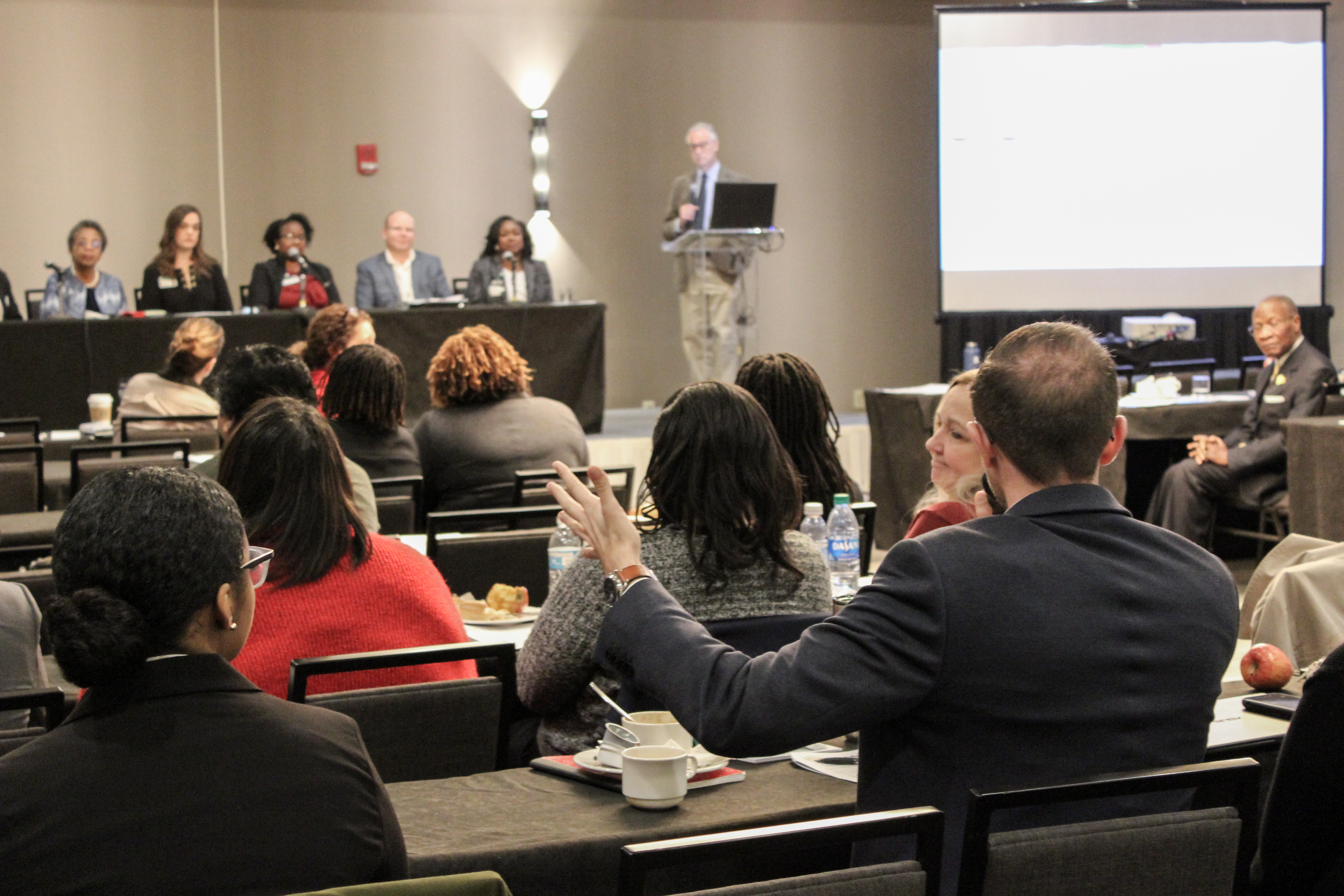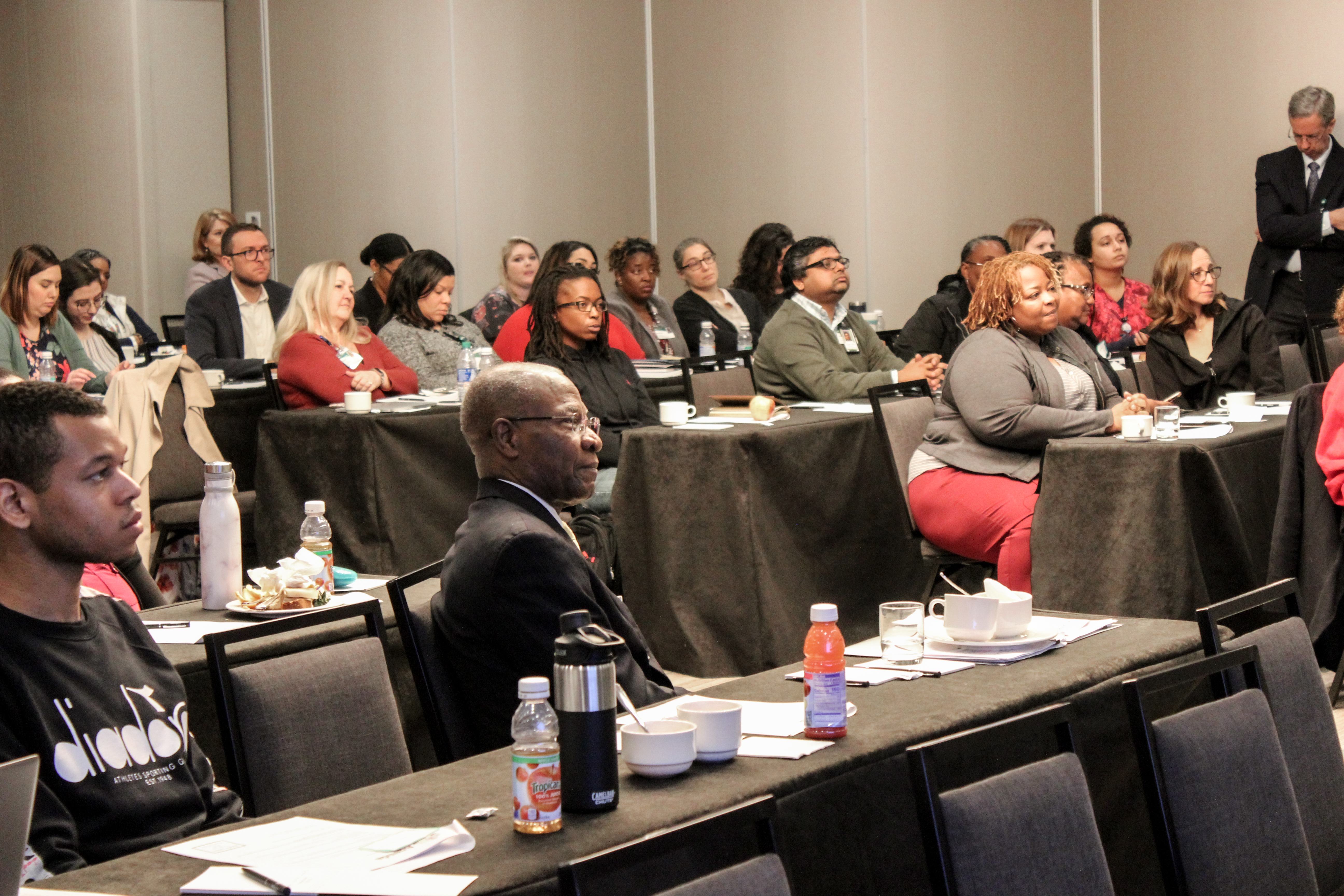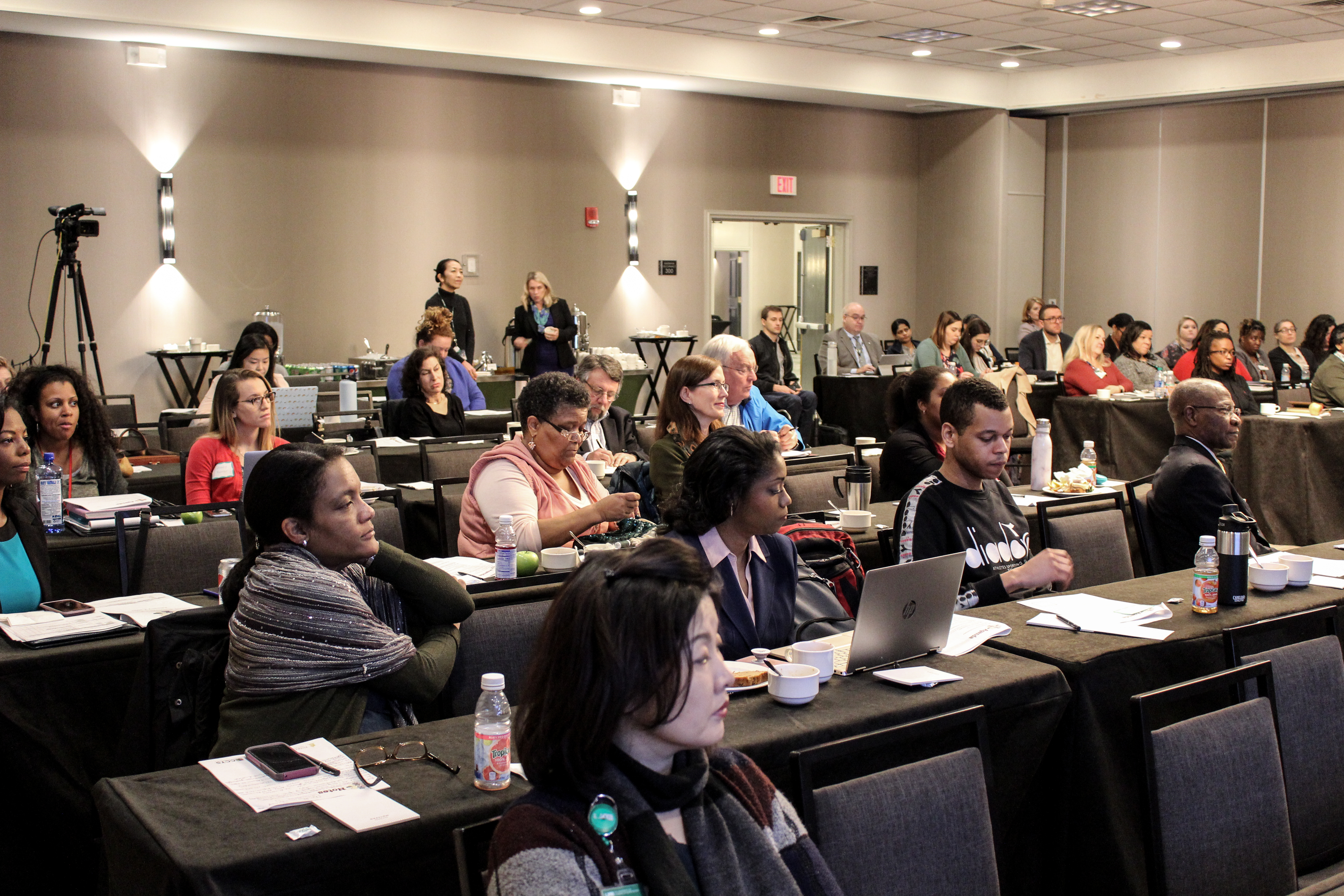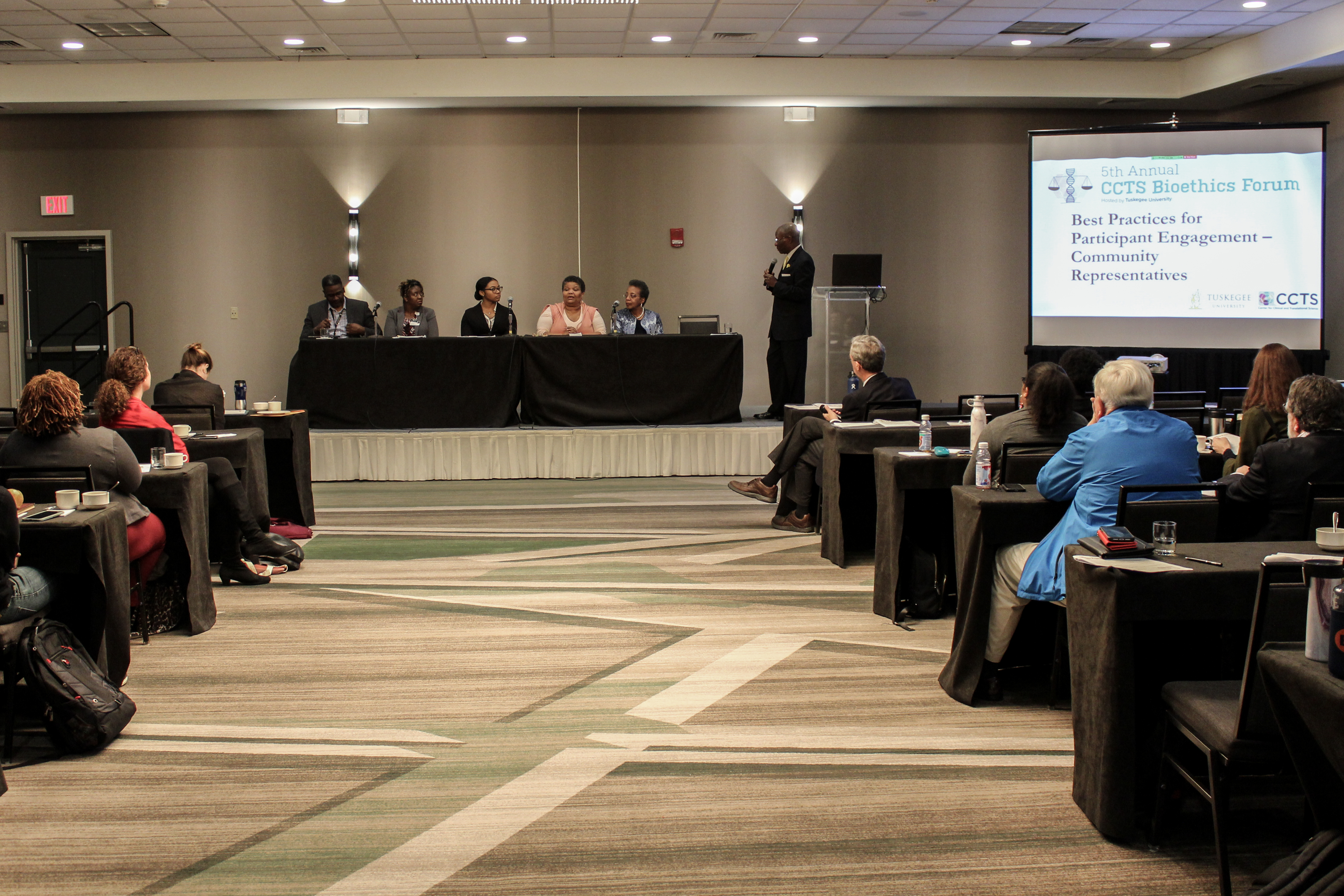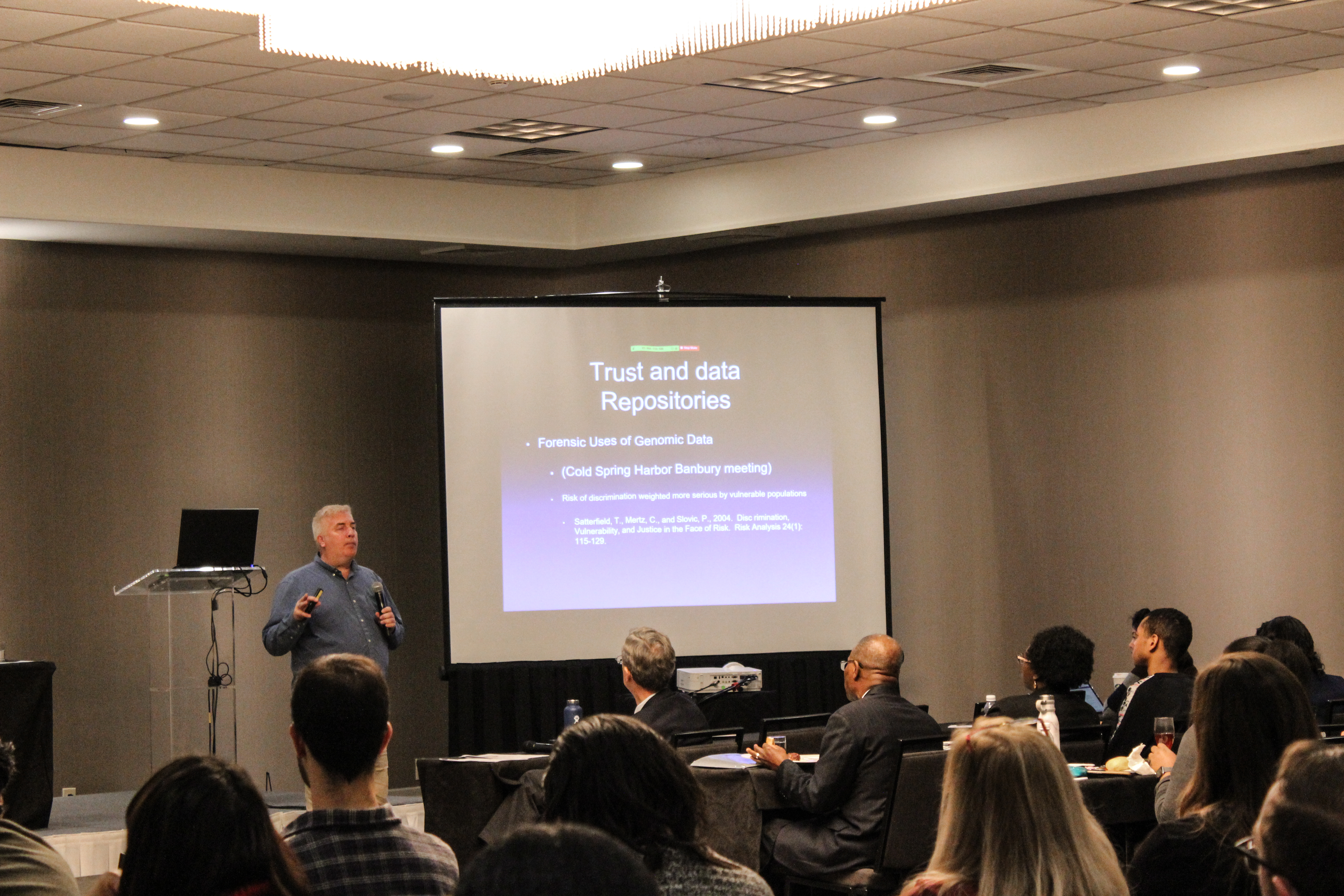Next up? Join us virtually for a fantastic look into medical device research and innovation with Kai Kuck, PhD, ME, Director of Bioengineering and Professor of Anesthesiology at the University of Utah.
Friday, February 14th from 1-2pm
Meeting Link: https://join.avc.uen.net/index.html?id=126&secret=1b76c575-c9cb-4721-a52ad30d79b1dfe7&lang=en-US
The 5th Annual CCTS Bioethics Forum took place on Monday, February 3rd in Birmingham, Alabama at the UAB Hilton. A record-breaking attendance gathered to discuss Engagement of Diverse Populations in Research: Challenges & Lessons Learned from Cohort Studies.
Faith Fletcher, PhD, MA, Assistant Professor of Health Behavior and Co-lead of the CCTS Engagement of Communities effort, and Stephen Sodeke, PhD, MA, Professor of Bioethics at the Center for Biomedical Research and Modern Languages, Communication, and Philosophy at Tuskegee University opened the forum with a reminder that everyone in research shares the same barriers to engaging research participants. “It was a relief to see that different researchers face many of the same challenges as we do. Even better was to have the opportunity to listen to some of the ways they tackle these challenges to build a better environment for their participants/communities,” shared Gustavo Schaun, early-stage investigator in the department of Cell, Developmental and Integrative Biology at UAB.
The forum consisted of real examples of engagement obstacles through the following studies:
Alabama Genomic Health Initiative (AGHI) - Unlocking the potential in the human genome is part of the future of health care, and as the state’s leader in genomic medicine, UAB Medicine is taking a major step forward with the Alabama Genomic Health Initiative (AGHI).
All of Us Research Program - All of Us is a new research program from the National Institutes of Health (NIH) with the goal of advancing precision medicine, health care that is based on you as an individual.
Jackson Heart Study - The Jackson Heart Study exemplifies a unique collaborative model among Jackson State University, the Mississippi State Department of Health, Tougaloo College and the University of Mississippi Medical Center to discover and test best practices for eliminating health disparities.
Risk Underlying Rural Areas Longitudinal (RURAL) - The RURAL (Risk Underlying Rural Areas Longitudinal) Cohort Study aims to address critical gaps in our knowledge of heart and lung disorders in rural counties in the southeastern US.
Multicenter AIDS Cohort Study/Women’s Interagency HIV Study Combined Cohort Study (MACS/WIHS-CCS) - This combined cohort study aims to advance knowledge of HIV infection, with a focus on HIV-related comorbidities, investigating the progression of HIV disease in men and women.
The panel discussions and keynote lecture are both available for viewing on the CCTS Video Channel. Note: Due to technical difficulties during the event, the recording is edited.
Want to continue learning about ethics issues? Dr. Sodeke will present Legacy of Syphilis Study and Ethical Considerations for Health Disparities Research with Older Adults: A Bioethics Dialogue at an upcoming Resource Centers for Minority Aging Research (RCMAR) webinar on February 14th, 2020. Click here for more details and to register via Zoom.
Special thanks to the 5th Annual Bioethics Forum Planning Committee: David Chaplin, MD, PhD, Faith Fletcher, PhD, MA, Bruce R. Korf, MD, PhD, Chiquita Lee, BS, MBA, Lucio Miele, MD, PhD, Mariko Nakano, PhD, Becky Reamey, PhD, Stephen Olufemi Sodeke, PhD, MA
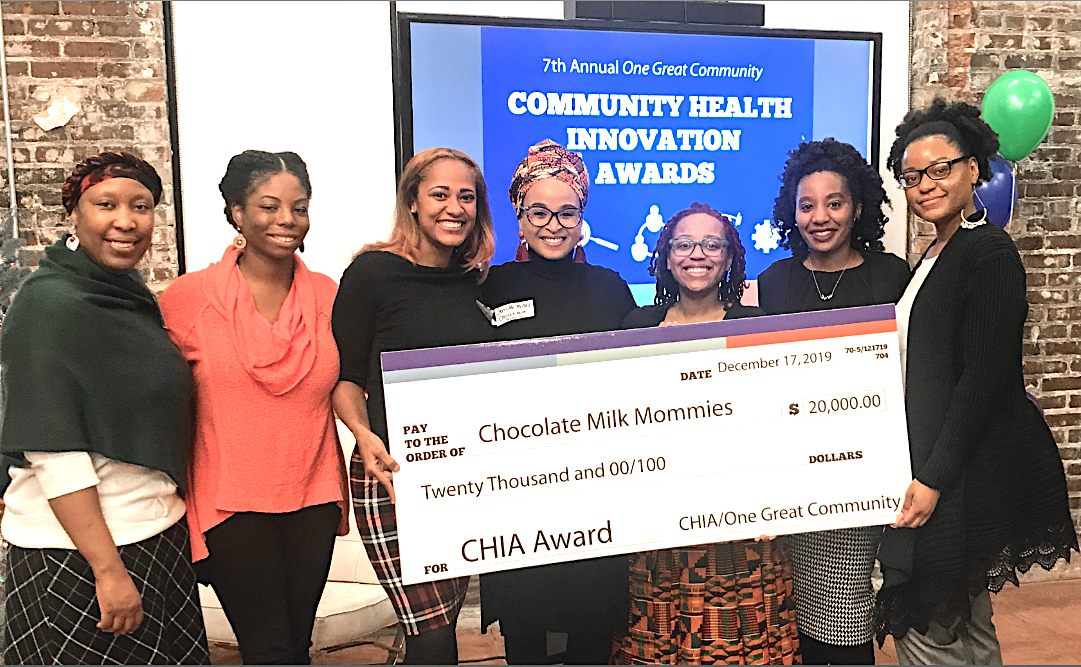 When Jennifer Miller experienced breastfeeding challenges with her son, she searched for support in likely places, starting with a lactation counselor and her close family. When she wasn’t getting the answers she needed, she decided to seek advice online. “Once I saw that this is where I got most of my help from, from Facebook friends, I thought, Why not make this a community support group?”
When Jennifer Miller experienced breastfeeding challenges with her son, she searched for support in likely places, starting with a lactation counselor and her close family. When she wasn’t getting the answers she needed, she decided to seek advice online. “Once I saw that this is where I got most of my help from, from Facebook friends, I thought, Why not make this a community support group?”One of those friends was Angel Warren, who had the idea for a photo shoot designed to celebrate breastfeeding in the black community. “There is an association many generations-strong with slavery and wet nursing, and in the black community we are often taught that formula is the better option, the option associated with wealth,” shares Miller, who serves as this year’s Board President. The attention-getting photo of nine women breastfeeding their babies went viral, and Chocolate Milk Mommies was officially created. Miller and Rauslyn Adams began a community group, and CMM gained rapid recognition. Their mission? To provide lactation support for black mothers by providing the resources they need to initiate and continue their breastfeeding journey. Their strategy started with a photo shoot designed to celebrate breastfeeding in the black community. Chocolate Milk Mommies has served hundreds through online support and hundreds more through home visits, community baby showers, and ‘Mommy Meet Ups’.
Creating a community of support has been the bastion for CMM, but the founders focus their core messaging around the health benefits of breastfeeding. According to the Centers for Disease Control and Prevention, African American mothers have the lowest rate of breastfeeding initiation and duration. CMM addresses that disparity by providing evidence-based health information through their programs, and practical solutions to barriers black mothers may experience, like access to hospital-grade breast pumps. And it seems to be working—the number of women and families seeking CMM services has dramatically increased each year since the organization was established in 2017.
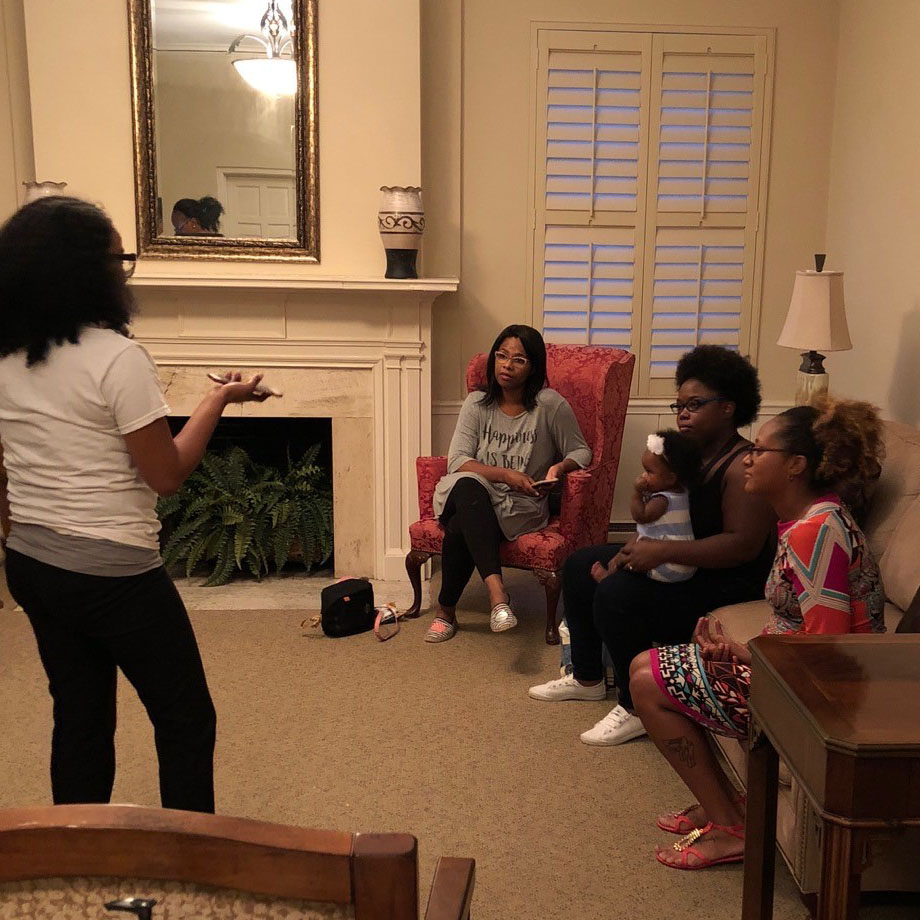 CMM’s focus on improving reproductive health with such a community-building approach resulted in a $20,000 Community Health Innovation Award (CHIA) in December. CHIA is an annual grant competition that encourages 501 (c)(3) organizations to think boldly and creatively about solutions to “on the ground” health challenges our communities face. The funding from CHIA will provide more home visits and hospital-grade breast pump rentals to teach and support mothers and their family members. When Miller found out that CMM had been awarded the CHIA funding? “Just tears. We want black mothers to know we’re here to help them and the funding means we can help even more moms.”
CMM’s focus on improving reproductive health with such a community-building approach resulted in a $20,000 Community Health Innovation Award (CHIA) in December. CHIA is an annual grant competition that encourages 501 (c)(3) organizations to think boldly and creatively about solutions to “on the ground” health challenges our communities face. The funding from CHIA will provide more home visits and hospital-grade breast pump rentals to teach and support mothers and their family members. When Miller found out that CMM had been awarded the CHIA funding? “Just tears. We want black mothers to know we’re here to help them and the funding means we can help even more moms.”Learn more about Chocolate Milk Mommies by visiting their Facebook page, and find out more on how community engagement plays a vital role in the mission of the CCTS.
The CCTS is pleased to announce the newest cohort for the Predoctoral Clinical/Translational Research (TL1) Program. The TL1 trainees represent predoctoral students finishing their second year in a health-related professions program. This immersive program provides 12 months of protected time for trainees to develop projects focused on reducing health disparities and/or diseases that disproportionately affect the Deep South. In addition, fellows will complete the core curriculum, get experience writing a manuscript, and present their research at a national conference.
The new cohort includes trainees from Auburn University, LSU Health Sciences Center, Tulane University, University of Alabama and UAB.
Congratulations to the 2020 TL1 Program Cohort:
|
Hasan Alrefai, UAB, Medicine |
Daniel Brake, UAB, Medicine |
|
Andres Camino, UAB, Medicine |
Brittannie Chester, Auburn University, Human Science |
|
Ryan Ferrie, Tulane University, Medicine |
Dulce Gomez, Auburn University, Kinesiology |
|
Braden Hahn, Auburn University, Engineering |
Justin Magrath, Tulane University, Medicine |
|
Cassidi McDaniel, Auburn University, Pharmacy |
Tiara Napier, UAB, Cancer Biology |
|
Khoa Nguyen, Tulane University, Medicine |
Jonathan Patterson, UAB, Informatics |
|
Doris Pu, UAB, Arts & Sciences |
Sydney Sheppard, UAB, Medicine |
|
Edgar Soto, University of Alabama, Medicine |
CCTS generally announces the TL1 Program call for applications in late fall. To learn more about the TL1 application process, visit the TL1 Program page.
The annual CCTS Clinical and Translational Science Training Program (CTSTP) is back in full swing, convening each Wednesday from January to June with the largest cohort to date. The 46 participants from three CCTS Partner Institutions represent a wide variety of disciplines and departments, as you can see in the list below.
Congratulations to the 2020 CTSTP Cohort:
| Hassan AbuNurah, UAB, Physical Therapy | Dylan Addis, UAB, Cardiothoracic Anesthesiology | Mansour Alotaibi, UAB, Physical Therapy |
| Mustafa Al-Obaidi, UAB, Institute for Cancer Outcomes and Survivorship | Abdulsalam Alsulami, UAB, Graduate Medical Education – Infectious Diseases | Yurany Andrea Arevalo Canizales, UAB, Neurology/StrokeNet |
| Cheyanne Barba, UAB, Psychology | Burthia Booker, UAB, Oral & Maxillofacial Surgery | John Bridges, UAB, Pediatrics/Rheumatology |
| Chia-Ying Chiu, Health Services Administration | Stephen Clarkson, UAB, Cardiology | Sarah Deemer, UAB, Nutrition Sciences |
| Radhika Gangaraju, UAB, Hematology & Oncology | Christopher Hurt, UAB, Physical Therapy | Jesse Jones, UAB, Neurosurgery |
| Dae Hyun Kim, UAB, Health Services Admininistration | Rubymel Knupp, UAB, Maternal-Fetal Medicine | Margaret Marks, UAB, Pediatrics/Endocrinology |
| Tatiana Marquez Lago, UAB, Genetics | Adriana Massicano Vidal Fernandez, UAB, Radiology | Kasi McPherson, UAB, Nephrology |
| Rachel Muir, UAB, Pathology | Donna Murdough, UAB, Pediatrics | Cassandra Newsom, UAB, Neurobiology |
| Samia O’Bryan, UAB, Cell, Development & Integrative Biology | Babak Orandi, UAB, Surgery | Jo Ann Otts, University of South Alabama, Adult Health Nursing |
| Scott E. Phillips, UAB, Pulmonary, Allergy & Critical Care | Caroline Presley, UAB, Preventive Medicine | Gina Rebesco, UAB, Radiation Oncology |
| Keyur Savla, UAB, Vision Science | Emily Spangler, UAB, Surgery/Vascular | Scott Strickler, UAB, Radiation Oncology |
| Kadambari Vijaykumar, UAB, Pulmonary, Allergy & Critical Care | Grant Williams, UAB, Hematology & Oncology | Jereme Wilroy, UAB, Physical Medicine & Rehabilitation |
| Ashley Wiltshire, UAB, Ob/Gyn | Julio Yanes, Auburn University, Psychology | Christopher Fowler, UAB, Peds/Pulmonary & Sleep |
| Dulce Gomez, Auburn University, Exercise Physiology | Cesar Gonzalez, UAB, Psychology | Rajesh Gupta, UAB Endocrinology |
| Jiay Hao, UAB, Biostatistics | David Harris, UAB, Radiation Oncology | Rashid Harunur, UAB, Oral & Maxillofacial Surgery |
| Joseph Jones, UAB, Radiation Oncology |

The CTSTP provides participants with more than 50 hours of didactic and interactive instruction in clinical and translational science competencies. Each session features experienced researchers and experts covering an array of topics, including grant writing and clinical trial management. Those who complete the course earn a certificate of participation. CTSTP can also be taken for credit towards a master’s degree in public health (EPI 680).
CCTS generally announces the CTSTP call for applications in late fall. To learn more, visit the CTSTP page.

